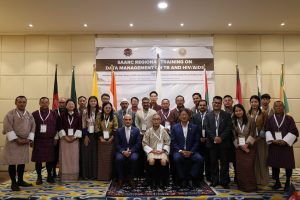SAARC Tuberculosis and HIV/AIDS Centre (STAC), Kathmandu
Press Release
Date: 1st September 2025
The SAARC TB and HIV/AIDS Centre (STAC), one of the Regional Centres of SAARC, has been working with the vision to support and guide National TB and HIV/AIDS Control Programmes of Member States to make the region free of TB and HIV/AIDS.
On the recommendation of the Thirty-Second Meeting of the Governing Board of STAC (28–29 October 2024), the Calendar of Activities of the Centre was approved by the Sixtieth Session of the Programming Committee (28–30 April 2025, SAARC Secretariat, Kathmandu). As part of these activities, the SAARC Regional Training on Data Management on TB and HIV/AIDS was successfully organized from 26–28 August 2025 in Thimphu, Bhutan, reaffirming the Centre’s commitment to strengthening the capacity of Member States in TB and HIV/AIDS data management and surveillance, in collaboration with the Department of Public Health, Ministry of Health, Bhutan.
The three-day training was attended by 11 participants from Bangladesh, Bhutan, India, and Nepal in person, while Pakistan joined virtually and 5 coordinators from Bhutan. The participants included programme managers and data officers from National TB and HIV/AIDS Programmes. The training was facilitated by three technical experts from Bhutan. Namely, Dr. Mongal Singh Gurung, Dr. Sithar Dorjee and Mr. Kinley Dorjee who served as Resource Persons.
The objectives of the training were:
- To strengthen the technical capacity of Member States in TB and HIV/AIDS data collection, validation, analysis, and reporting.
- To enhance knowledge and skills in the use of statistical software and tools for effective programme monitoring.
- To promote regional cooperation and exchange of best practices in data management.
The inaugural session was graced by Mr. Karma Jamtsho, Director, Department of Public Health, Ministry of Health, Bhutan, Dr. Anuj Bhattachan, Director, SAARC Tuberculosis and HIV/AIDS Centre, Nepal, and a Representative from the SAARC Development Fund, Bhutan. The dignitaries highlighted the importance of evidence-based decision-making, regional collaboration, and the need for robust data systems to achieve the SDG targets on TB and HIV/AIDS.
The training featured expert presentations, interactive discussions, and hands-on exercises using MS Excel and STATA. Participants also shared country experiences, identified gaps in data systems, and proposed collaborative solutions.
Key highlights of the training included:
- Improved technical knowledge on data management systems and tools for TB and HIV/AIDS.
- Enhanced regional cooperation and exchange of best practices.
- Development of draft action plans by participating countries to strengthen their national data systems.
Resource materials, PowerPoint presentations, practical exercises, and interactive methodologies were applied by the facilitators. Pre-test and post-test assessments were conducted, during the pretest, the average score was 9.6 with maximum of 16 and minimum of 4. with the training (during posttest), the average score has increased to 18.5, which is even higher than the maximum score of the pretest in addition, all the participants (100%) has increase in score, with average increase of 8 points. Thus, this session was 100% success with 38% increase in score.
Participants gained knowledge on advanced techniques of data collection, validation, analysis, and reporting through tools such as:
- MS Excel (advanced functions and pivot tables)
- STATA (data validation, statistical analysis, and reporting)
The programme concluded with a panel discussion and reflections from participants, who emphasized the importance of quality data for programme monitoring and policy formulation. At the closing session on 28 August 2025, vote of thanks was delivered by Mr. Sanjeeb Kumar Jha, Statistician, STAC and Dr. Anuj Bhattachan, Director, STAC delivered closing remarks, appreciating the efforts of STAC, the Ministry of Health Bhutan, SAARC Secretariat, Ministry of Health of SAARC Member States, Ministry of Foreign/External Affairs of SAARC Member States for their support in making the training a success.
*****



